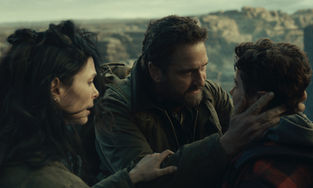'True Detective: Night Country' season 4 review: Jodie Foster & Kali Reis uncover chills & kills in HBO crime drama
- S.J.

- Jan 16, 2024
- 3 min read
Updated: Aug 10, 2024

Whenever a title already suggests that two completely different ideas or worlds were merged, one can rightfully be a little bit worried about the outcome. However, in those cases it might be good to be very unfamiliar with prior seasons as yours truly can attest. Anthology series 'True Detective' shifts gears with its fourth season, officially titled True Detective: Night Country, retaining its crime drama essence but adding more eerie horror elements as well.
Jodie Foster stars as Liz Danvers, a detective in a small town of Ennis, Alaska who receives a new, mysterious case where eight men from a questionable research facility first disappear and are found dead later. Finding a connection between this and an unsolved case handled by state trooper Evangeline Navarro (Kali Reis), with whom Foster shares a fragmented past due to their shared experiences, the dynamic duo team up again to dig up secrets and unexplainable truths. Involved in the investigation also are Danvers' subordinates, officers Peter Prior (Finn Bennett) and his dad Hank (John Hawkes).
There are two paths that you can look at separately at first: an animalistic, primal warning that the ominous opening scene establishes and the series' well-written human drama, before they ultimately begin to clash when we're heading toward a resolution. The former is perhaps more noticeable when it comes to mood and tonality as showrunner-director Issa López is pulling from horror and lore to build this reality as she's been brought in to reimagine the show for this season.
Reality is the key word here as López and her team overcome the Icelandic landscapes, accents and redecoration by focusing on what is actually important, which can be relationships, dialogue or emotion depending on the situation. You recognise the strong and specific creative vision immediately, which is easy thanks to Florian Hoffmeister's restrained yet gorgeous photography that captures the fine acting, great casting by Francine Maisler and a nice harmony between Daniel Taylor's production design, decor and special effects. Not only are the characters' homes and workplaces neatly detailed but there is also a really striking, horrifying piece of design revealed when the bodies are found, again complementing the horror aesthetics. Ennis as a place feels tactile because of that shared creative vision and that is why you get invested in the murder mystery and terrible treatment of a vulnerable community living there.
Mostly you're invested in the storytelling because the human drama works as well as it does. All the main characters have their own past, present and a possible future. Liz is a rather self-destructive personality who has a severed connection with her stepdaughter Leah (Isabella Star LaBlanc), Evangeline struggles with a false sense of guilt and a mystical presence, Peter is motivated in his work but doesn't exactly know what actually matters to him and even Hank has a perfectly embarrassing storyline about a mail-order bride—this is also a nice touch of levity along the way. All of them and a few other important characters feel like real people so you do want to spend time with them.
It's not a difficult connection to make that actors therefore benefit from those nuances. Foster especially is in top-tier mode here as she's just endlessly watchable as Liz because she uses space, elements and other actors in a way that commands your attention; you understand her character's weariness and flaws as a viewer from the very first scene all the way to the end, without unnecessary exposition, by the way. Reis has some stumbles when carrying scenes on her own but shines whenever she's acting with Foster since she's able to constantly match the intensity, which paints new colours and shades of Evangeline on the canvas. Bennett also shares good chemistry with Foster while Hawkes' portrayal of sadness and desperation fits the town's overall vibe very well.
López and the crew's overall construction of the season feels purposeful when talking about the themes—man against nature, corruption, justice, bloodlines—and there's not a single episode that deviates from that purpose. Zooming in, there are certainly a few misdirections and character arcs, as well as jump scares, from episode three to five that don't quite fit the narrative structure as it seems like a bit too much intensity for this short amount of time that we spend with these characters. Thankfully that's only a small crack in the ice so you don't have to worry about falling. ''Night Country'' is otherwise a chilling, carefully crafted and beautifully mystifying tale that makes you want to know its secrets and take them to your glacial grave.
Smileys: Jodie Foster, atmosphere, writing, characterisation
Frowneys: Some issues with structure
What cost more? The songs by Billie Eilish or the bonuses for those hundreds of producers mentioned who had nothing to do with this season.










